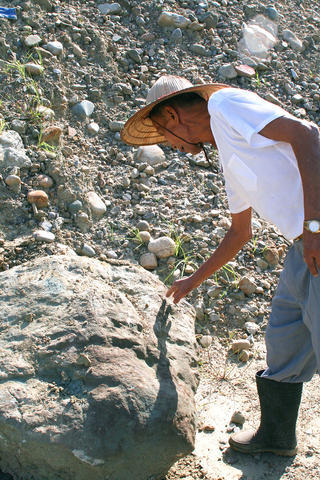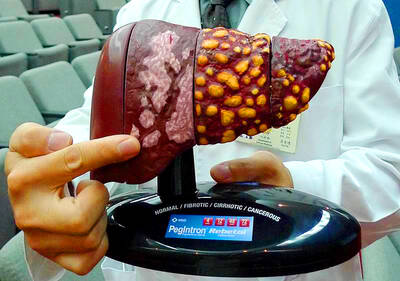A historian called yesterday for stronger conservation measures for Lo Sheng ("Happy Life") Sanatorium after discovering fossils at the construction site of an MRT maintenance depot last month.
The Taipei County sanatorium is a sprawling complex built during the Japanese colonial era to isolate people suffering from Hansen's disease, also known as leprosy. Plans to tear down most of the sanatorium's buildings to make room for an MRT maintenance depot have met with strong opposition.
Activists protested the demolition on the grounds that it meant evicting its residents.

PHOTO: LOA IOK-SIN, TAIPEI TIMES
They received support for their cause when Tamsui-based historian Chi Jung-ta (
"The hills [of Lo Sheng] are composed of sedimentary rocks, which contain fossilized remains of prehistoric marine life such as seashells, since [the area] was once seabed," Chi explained to the Taipei Times in a telephone interview.
After consulting with Chen Wen-shan (陳文山), a geoscience professor at National Taiwan University, Chi said that the fossils belonged to the Pliocene era, "which is at least 5 million years before our time," Chi said, adding that further examination would be needed to gain a more detailed picture.
Unfortunately, a lot of the rocks with fossils have been destroyed, Chi said.
"When I went to the construction site in June, I saw them [construction workers] breaking the rocks into sandstone to use as construction material," he said.
Chi said there were many tombs of Chinese settlers from the Qing Dynasty within Lo Sheng's perimeter.
"We could make the entire area into an on-site exhibition not only of Taiwan's public health history, but also of the history of settlers and of paleontology," Chi said.
Fang Juang-lih (
"I've asked the [Taipei] County Cultural Affairs Bureau and the construction firm to further investigate the matter and submit a report," he said.
"We'll decide what to do after receiving the report," he said.
Although the discovery was made last month, the construction was only halted on Tuesday after an assistant to Taipei City Councilor Lin Jui-tu (

The Executive Yuan yesterday approved a southwestern extension of the Sanying MRT Line from New Taipei to Bade District (八德) in Taoyuan, with a goal of starting construction by late 2026. The 4.03-kilometer extension, featuring three new stations, will run from the current terminus at Yingtao Fude Station (LB12) in New Taipei City to Dannan Station (LB14), where it will connect with Taoyuan’s Green Line, New Taipei City Metro Corp said in a statement. This extension will follow the completion of core Sanying Line, a 14.29-kilometer medium-capacity system linking Tucheng (土城), Sansia (三峽)

CARGO LOSS: About 50 containers at the stern of the ‘Ever Lunar’ cargo ship went overboard, prompting the temporary closure of the port and disrupting operations Evergreen Marine Corp, Taiwan’s largest container shipper, yesterday said that all crew members aboard the Ever Lunar (長月) were safe after dozens of containers fell overboard off the coast of Peru the previous day. The incident occurred at 9:40am on Friday as the Ever Lunar was anchored and waiting to enter the Port of Callao when it suddenly experienced severe rolling, Evergreen said in a statement. The rolling, which caused the containers to fall, might have been caused by factors including a tsunami triggered by an earthquake in Russia, poor winter sea conditions in South America or a sudden influx of waves,

The Ministry of Culture yesterday officially launched the “We TAIWAN” cultural program on Osaka’s Nakanoshima sandbank, with the program’s mascot receiving overwhelming popularity. The cultural program, which runs from Aug. 2 to 20, was designed to partner with and capitalize on the 2025 World Expo that is being held in Osaka, Japan, from April 13 to Oct. 13, the ministry said. On the first day of the cultural program, its mascot, a green creature named “a-We,” proved to be extremely popular, as its merch was immediately in high demand. Long lines formed yesterday for the opening

STAY VIGILANT: People should reduce the risk of chronic liver inflammation by avoiding excessive alcohol consumption, smoking and eating pickled foods, the physician said A doctor last week urged people to look for five key warning signs of acute liver failure after popular producer-turned-entertainer Shen Yu-lin (沈玉琳) was reportedly admitted to an intensive care unit for fulminant hepatitis. Fulminant hepatitis is the rapid and massive death of liver cells, impairing the organ’s detoxification, metabolic, protein synthesis and bile production functions, which if left untreated has a mortality rate as high as 80 percent, according to the Web site of Advancing Clinical Treatment of Liver Disease, an international organization focused on liver disease prevention and treatment. People with hepatitis B or C are at higher risk of